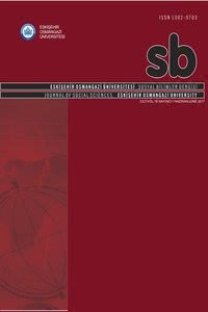Yolcuların Ulaşım Aracı Olarak Yüksek Hızlı Treni Tercih Nedenleri Üzerine Bir Araştırma
Ulaştırma sektöründeki küresel ve teknolojik gelişmeler pazarın genişlemesini sağlarken, ulaştırma türleri arasında da yoğun bir rekabeti beraberinde getirmiştir. Bu nedenle yolcuların ulaşım aracı seçimlerindeki faktörlerin tespit edilmesi büyük önem taşımaktadır. Bu çalışmada Türkiye’de Yüksek Hızlı Tren (YHT) projesinin başarıya ulaşması ve trenlerin daha iyi hizmet verebilmesi için demiryolu yolcularının YHT’yi tercih etme nedenleri tespit edilmeye çalışılmıştır. Yolcu profillerinin değişebileceği düşüncesiyle anket uygulamaları haftanın farklı gün ve saatlerinde gerçekleştirilmiştir. Tesadüfî örneklem metoduyla 800 adet anket uygulanmış bunların 762 adedi uygun görülerek analiz edilmiştir. Elde edilen sonuçlara göre YHT’nin tercih nedenleri arasında birinci öncelikli olarak zamandan tasarruf sağlamak yer almaktadır. Ayrıca trenlerin konforlu, dakik ve fiyatlarının uygun oluşunun da müşteri tercihlerinde etkili olduğu saptanmıştır
Anahtar Kelimeler:
Yüksek Hızlı Tren (YHT), tercih nedenleri, Demiryolu, Ulaştırma
A RESEARCH ON PASSENGERS’ REASONS FOR CHOOSING HIGH SPEED TRAIN AS A MEANS OF TRANSPORT
The global and technological developments in transportation sector helped the expansion of the market and brought intensive competition among the types of transportation. Thus determining the factors effecting passengers’ decisions on choosing the means of transport is vital. In this study the railway passengers’ reasons for choosing the high speed train (HST) have been attempted to be determined in order to serve better on trains and make high speed train project successful in Turkey. Questionnaires were carried out at different hours and on different days of the week in case the passenger profiles could change. 800 questionnaires were carried out in random sample method. 762 of those questionnaires were valid and they were evaluated. According to the results, among the reasons for choosing HST time saving comes first. Moreover, comfort of the trains, their punctuality and reasonable prices affect passengers’ preferences.
Keywords:
High Speed Train (HST), preference reasons, railway, transportation,
- Başlangıç: 2000
- Yayıncı: -
Sayıdaki Diğer Makaleler
PIERRE BOURDIEU’NUN NEOLİBERALİZM ELEŞTİRİSİ BAĞLAMINDA EĞİTİM YÖNETİMİNİ YENİDEN DÜŞÜNMEK
ÖTEKİLER’İN TEMSİLLERİ: RESTORASYON SAHNESİNDE MÜSLÜMAN TÜRK İMAJI
İNGİLTERE’DE UYGULANAN PERFORMANS ESASLI BÜTÇE SİSTEMİ’NİN DEĞERLENDİRİLMESİ
Lev Tolstoy's comparative assessment of the 20th century English writers
Pierre bourdieu'nun neoliberalizm eleştirisi bağlamında Eğitim yönetimini yeniden düşünmek
Representations of The 'Others': image of Muslim Turks on the restoration stage
Cunhuriyet döneminde Tokat'ın maruz kaldığı seller (1934-1949)
LEV TOLSTOY’UN GÖZÜYLE XX. YÜZYIL İNGİLİZ YAZARLARI
Enerji kullanımının küresel ısınmaya etkisi ve önleyici politakalar
